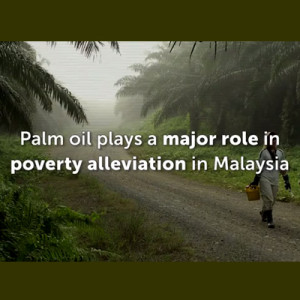No deforestation campaign is a slogan with no evidence
The latest trend for NGOs and companies attempting to limit, or stop, the progress of palm oil, is the ‘No Deforestation’ agenda, led by the for-profit NGO, The Forest Trust (TFT). The campaign is disarmingly simple, with a snappy slogan that is designed to sound like a perfect solution. Who could possibly object? The fact is that the campaign is a threat to the continued success and prosperity of the smallholder + larger plantation model. This model has been the foundation of the success of oil palm in Malaysia – bringing prosperity, income and development to rural communities across the nation.
The TFT campaign undermines this.
Some Western consumer goods companies have swallowed the ‘No Deforestation’ bait, and now find themselves on the NGO hook. Sadly, they did not stop first to think about the consequences of such a knee-jerk response – the consequences both for their own operations, and for their suppliers and producers in the developing world.
The ‘No Deforestation’ campaign runs counter to the definition of sustainability – the definition as outlined by the United Nations. This is clear that sustainable development must include economic and social factors, alongside environmental factors. As the UN recognizes, there is often a trade-off to be made. Developing countries, particularly in tropical regions, need well-managed forest transition in order to develop. This development, such as for a profitable crop such as oil palm, brings with it a huge number of desirable outcomes: incomes rise; rural populations are lifted out of poverty; investment and infrastructure are built (to name just a few). These desirable outcomes are only achievable if your starting point is that we must find a trade-off to balance the economic and social needs of a people, with the environmental demands of others.
The authors of the ‘No Deforestation’ campaign are clearly not interested in recognizing this trade-off, and are consequently standing in the way of these desirable outcomes being achieved. If ‘No Deforestation’ (an environmental demand) is the only metric by which they measure ‘success’, then economic and social benefits such as poverty alleviation, investment, and social progress for rural areas are ignored. This is unacceptable to many Malaysian growers, in particular small farmers.
Small farmers across Malaysia – numbering in the hundreds of thousands – are those whose lives have been most markedly improved by cultivating oil palm. They are also those whose lives have been made most difficult by Western certification schemes, including TFT’s ‘No Deforestation’. One major consumer goods company in Europe – Unilever – estimates that it will cut 80% of small farmers from its supply chain. Why are small farmers being cut? Because the new demands on them are simply too expensive and onerous for them to afford, so they cannot meet the TFT/No Deforestation demands. In other words, a scheme has been developed by an environmental NGO that sidelines small farmers, and forces them out of the marketplace.
How can it be claimed that this is true sustainable development? In reality, what is happening is that the environment-only policies of TFT are being put ahead of the balanced sustainable development policies outlined by the United Nations.
Forcing small farmers from the supply chain would be a scandal in many other industries: some NGOs would in fact protest. But, oil palm small farmers are not given the same fair treatment – their expulsion from the supply chain is being plotted and planned by those who have authored, and signed up to, the No Deforestation campaign.
Despite this scandalous situation, it is not all bad news currently for small farmers, and for the palm oil industry in Malaysia. The planned new Malaysian Sustainable Palm Oil (MSPO) standards will bring fairness to the certification debate, and will look to include in a balanced way both larger plantations and smallholders. MSPO could usher in a new approach to these palm oil standards – where the environmental needs are taken as seriously as ever, but where the needs of small farmers are also central. Economic, social, and environmental: this is the model of sustainable development in the palm oil world that MSPO will embrace, and it could point the way forward for other developing world nations that also have found problems with NGO-led standards.










Leave a Reply